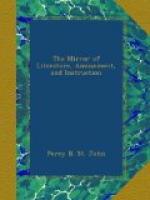Charming away the Hooping Cough.
An English lady, the wife of an officer, accompanied her husband to Dublin not very long ago, when his regiment was ordered to that station. She engaged an Irish girl as nurse-maid in her family; and, a short time after her arrival, was astonished by an urgent request from this damsel, to permit her to charm little miss from ever having the hooping-cough, (then prevailing in Dublin). The lady inquired how this charming business was performed; and not long after had, in walking through the streets, many times the pleasure of witnessing the process, which is simply this:—An ass is brought before the door of a house, into whose mouth a piece of bread is introduced; and the child being passed three times over and under the animal’s body, the charm is completed; and of its efficacy in preventing the spread of a very distressing, and sometimes fatal disorder, the lower class of Irish are certain.
The Legend of Hell Mary Hill.
Not many miles from Sheffield, as I was told by one who resided near the place, there is a forest; and in an out-of-the-way part of it, a hill, tolerably high, covered with wood, and vulgarly called Hell Mary Hill, though probably this is a name corrupted from one more innocent or holy. Near the top of it is a cave, containing, it is said, a chest of money,—a great iron chest, so full, that when the sun shines bright upon it, the gold can be seen through the key-hole; but it has never yet been stolen, because, in the first place, a huge black cat (and wherever a black cat is there is mischief, you may be sure) guards the treasure, which bristles up, and, fixing a gashful gaze on the would-be marauder, with fiery eyes, seems ready to devour him if he approach within a dozen yards of the cave; and, secondly, whenever this creature is off guard, (and it has occasionally been seen in a neighbouring village,) and the treasure has been attempted to be withdrawn from its tomb, no mortal rope has been able to sustain its weight, each that has been tried invariably breaking when the coffer was at the very mouth of the cave; which, being endowed with the gift of locomotion, has immediately retrograded into its pristine situation! I have mentioned this tradition, as it was told to me, because it is so curiously coincident with the German superstition of treasure buried within the Hartz mountains, guarded, and ever disappointing the cupidity of those who would discover and possess themselves of it.
Fairy Loaves.
Being lately in Norfolk, I discovered that the rustics belonging to the part of it in which I was staying, particularly regarded a kind of fossil-stone, which much resembled a sea-egg petrified, and was found frequently in the flinty gravel of that county. They esteemed such stones sacred to the elfin train, and termed them fairy loaves, forbearing to touch them, lest misfortunes should come upon them for the sacrilege. An old woman told me, that as she was trudging home one night from her field-work, she took up one of these fossils, and was going to carry it home with her; but was soon obliged to drop it, and take to her heels as quick as might be, from hearing a wrathful voice exclaim, though she saw nobody, “Give me my loaf! Give me back my loaf, I say!”—New London Literary Gazette.




